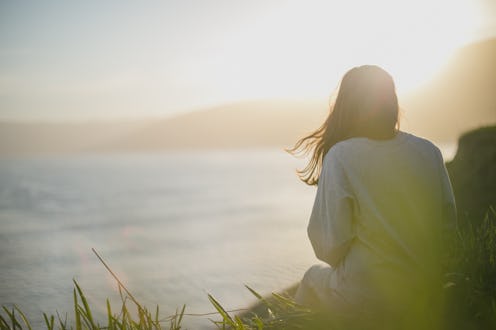Life
11 Habits That Help Prevent Anxiety Attacks

If you have ever suffered from an anxiety attack, you know how awful they can be, and you would liekly do anything to make sure it doesn't happen again. It might seem difficult to control when when anxiety strikes, but there are a number of habits that can help prevent anxiety attacks. Everyone has their own triggers, but knowing what to do when you're feeling anxiety strike — or even when you're just living your day-to-day-life — can help stop anxiety attacks in their tracks and even limit potential attacks in the future.
"Anxiety attacks are so called because they seem to attack the person with disturbing symptoms out of nowhere," says psychologist James I. Millhouse, Ph.D. over email. "Anxiety attacks originate at the unconscious level with the cause sometimes in awareness and sometimes not."
An attack might be triggered by exposure to something that reminds them of a time when they underwent significant trauma, says Millhouse. But more commonly, the anxiety attack occurs when an individual is in a situation when their unconscious or conscious mind feels that their resources to cope with the situation might not be adequate or up to their standard.
No matter what causes them, anxiety attacks are unpleasant and scary, and they're never welcome. To make sure you get as new anxiety attacks as possible, or even better, none at all, try incorporating these 11 habits into your everyday routine.
1Deep Breathing
There's a reason everyone tells you to "Just breathe." Deep, abdominal breathing is the best first "attack" on the fight or flight response. "Deep breathing reverses the speed by engaging the parasympathetic nervous system that actively slows everything down," says psychologist Deborah E. Dyer, Ph.D. over email. "Heart rate and breathing rate slow down, muscles begin to relax, hands and feet start to warm up, butterflies go away, etc."
2Progressive Muscle Relaxation
This is a quick and easy way to be more aware of your own muscle tension earlier so you can actively relax. "Practice at home in the evening to relax before going to bed," says Dyer. Starting at your feet, tense and relax sections of your muscles — starting from your lower legs up to your face — for about 5-7 seconds. Then completely relax for about 30 seconds. Repeat each body section twice before moving up the body.
3Sleeping Enough
"When we sleep, we aren't actively thinking and when we enter a restful state we heal ourselves at the cellular level," says clinical psychologist Dr. Sanam Hafeez over email. "Getting a solid 7 hours sleep influences the internal body clock which helps to keep panic attacks from hitting." A study from Binghamton University even found that people who sleep for shorter periods of time experience more negative thoughts than those who sleep longer.
4Exercising
Regular exercise can have a significant impact on reducing anxiety, according to PsychCentral. "Things like cycling, rowing, tennis, running, anything the requires a repetitive motion are great bets for anxiety," says Hafeez. "When you are engaged in moving your body deliberately, you're more focused in the moment." Additionally, exercise reduces the stress hormones adrenaline and cortisol while simultaneously stimulating the production of endorphins, a "feel-good" hormone.
5Meditating
Research from the journal JAMA Internal Medicine shows that mindfulness meditation is more effective at quelling anxiety symptoms than regular stress-relieving techniques. "Usually you stop thought by focusing on a noise or your own breath or heartbeat," says Hafeez.
6Journaling
Multiple studies show that writing about your feelings can help ease anxiety. "Journaling about the things that make you anxious may lead to writing out possible solutions," says Hafeez. "On one side of a page, write out the worst possible outcome. Then on the other side of the page write out the best possible outcome. The more solutions and possibilities we are able to see, the less anxious we feel."
7Eating Healthy Foods
They may not seem connected, but your diet can have an impact on your mental health. Avoiding processed foods like sugar and refined wheat as well as eating plenty of healthy, whole foods with lots of nutrients can help prevent anxiety attacks, according to Livestrong.
8Laughing
It's true that laughter is the best medicine. Sense of humor and laughter can reduce symptoms of anxiety and depression, according to a study form Heart & Lung: The Journal of Critical Care. Watch a funny movie or YouTube video and have a good laugh when you're feeling like your emotions are out of your control.
9Making A Gratitude List
Multiple studies have found that higher levels of gratitude are associated with lower levels of anxiety and depression. Everyday, make a list of a few things you're grateful for. Expressing gratitude can especially help with better sleep, which in turn helps to reduce anxiety.
10Spending Time Outside
Nature seems healing for a reason. One study published in the journal Environmental Science & Technology found that people experienced the largest boosts to their mood after just spending five minutes outside with some light movement like walking.
11Spending Time With Friends
Spending time with friends and family is more important than you might realize. Research from the journal Biological Psychiatry shows that People who have the most social support tend to respond less negatively to stress than those who spend most of their time alone. This is because spending time with others releases oxytocin, another "feel-good" hormone that has anxiety-reducing effects.